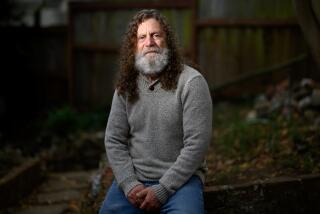WHY THE RECKLESS SURVIVE . . . and other Secrets of Human Nature <i> by Melvin Konner (Viking: $18.95; 288 pp.) </i>
- Share via
As with most scientists trying to extend the frontiers of knowledge, sociobiologists, whose field is advancing at breakneck speed as we unravel DNA’s secrets, haven’t always been greeted warmly by their colleagues in academe. E. O. Wilson had water poured on his head at an annual meeting of the American Assn. for the Advancement of Science, for instance, while his colleague Sandra Scarr was spat upon by demonstrators.
Little wonder there is such scorn, for sociobiologists have had the audacity to speculate on the deepest mysteries of human being; they have depicted the soul, for instance, not as the core of uniquely human nature envisioned by poets and preachers, but as a series of biochemical reactions. Even suicide, some sociobiologists say, may result rather from seretonin imbalance than from deep philosophical Angst .
One might think that a book on human nature by someone as irreverent as Melvin Konner would only stoke the fire. (Konner’s last work, an unsparing critique of Harvard Medical School, provoked the Los Angeles Times reviewer to conclude that the school’s only glaring mistake may have lain in admitting Konner.) But although Konner continues to delight in challenging conventional wisdom--speculating here, for instance, that the first tools might have been sticks and slings invented by women--his authorial voice has grown warmer, more empathic. He realizes that our attempts to define what is “uniquely human” have been almost humorously abortive: We used to distinguish ourselves from animals by pointing proudly to our reason, for instance, but once computers started out-reasoning us in many respects, we began pointing back to our emotions, deriding “unfeeling” machines. Instead of snidely dismissing our need to hold on to some workable definition of human singularity, though, Konner goes in search of it.
What he finds--our unique ability to understand the tragic dimensions of life--ultimately affirms the wisdom of the poets and preachers that sociobiology is sometimes seen as supplanting. As Konner writes in his discussion of computers: “We will ask them to speculate about the influence of Shakespeare on Shelley . . . but we will not curl up near the fire with a slim volume of verse they have written. We will go to them for most sorts of medical diagnoses . . . but at our bedside while we are dying we will want someone who knows that he or she will also, someday, die. Computers will be perhaps like the gods of ancient Greece: incredibly powerful and even capable of many human emotions--but, because of their immortality, ineligible for admission into that warm circle of sympathy reserved exclusively for humans.”






